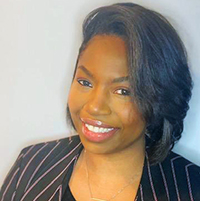 The industry event anyone in secured finance attends now celebrates its 77th year. SFNet is set to make the Arizona convention a memorable one. Click below to register.
The industry event anyone in secured finance attends now celebrates its 77th year. SFNet is set to make the Arizona convention a memorable one. Click below to register.

Laquanda N. Franklin
VP, Underwriting, White Oak Commercial Finance
Laquanda Franklin is a vice president of underwriting in ABL and factoring with White Oak Commercial Finance LLC where she has been for just over 12 years. Laquanda’s primary focus is managing client relationships and servicing WOCF portfolio loans. Her career at White Oak Commercial Finance started through a training program which allowed her to work and learn from various departments in the business.
Laquanda’s skillset plus her willingness to take on additional/new responsibilities has made Laquanda a valuable member of the White Oak team. Her methodical approach and ability to ask probing questions has allowed her to take on more complex credits, all the while maintaining a rapport with senior executives that allow them to feel Laquanda has their best interest at heart.
Laquanda earned a B.S. in finance from Seton Hall University. Previously, she worked at GMAC Commercial Finance as a team leader in Client Accounting. She also serves as the secretary for the Commercial Finance League.
What advice would you offer to women just starting out in the industry?
You have to recognize that you are going to need to step out of your comfort zone, and in doing so, the gains can be tremendous. Some of us can have the tendency to want to know everything, without question, before venturing into something new. This can lead to a hesitancy to seek out opportunities that you might feel you are not “qualified” for. It’s important to take those opportunities (and the challenges that go along with them) and learn something new. The saying goes, you’ll never learn until you try. Sometimes, you may not realize how good you are at something until you try it. Oftentimes, the situations that can make you the most uncomfortable are what you learn the most from.
How can commercial finance organizations attract and retain more women?
Personally, I can say that I have been blessed with some great mentors in this field. There is something to be said for allowing a person to be themselves while also teaching and pushing them to grow, and I have certainly had that. I can also say that I have been in many a room where I was the only woman. Being the only woman in the room really opens your eyes to the different ways that men and women communicate. Building off that, there needs to be a realization and knowledge that these differences exist. It’s not enough to hire women and expect them to fall in line, per se. These differences need to be acknowledged and fostered. Mentoring really shouldn’t be a one size fits all. What works for men doesn’t necessarily work for women, and vice versa. Once this approach is more readily taken in the industry, I think you will certainly see an uptick in the number of women that are not only interested in considering the field but in staying in the field as well.
What effect, if any, has working remotely had on your career and/or your industry? What have been the challenges and how have you worked to overcome them?
I would say that it has had a positive impact industry-wise in that it has shown that the work itself, as well as the client relationships, can still be tackled and managed successfully. I think that, when everything started, there was an underlying thought that things have not been done this way on a large scale before and maybe some things would slip through the cracks. A year into this, it’s clear that was not the case.
The biggest challenge for me personally has been that I have missed the collaborative nature of being in the office with everyone. I’m always learning every day and there is something to be said for hearing a conversation between a colleague and an attorney/client, etc. discussing ideas and approaches to situations that you have not necessarily thought of before. That experience is certainly missed in the remote environment, but I think that, if you have a good team, you pick up the phone and talk. It might spark things to a different extent, but the value is still there.
What do you think work will look like in the post-pandemic world?
Building from my earlier point, I do think that we could see hybrid workweeks in the future. Things are still getting done and they are getting done well. Taking out the element of these longer commutes that some people deal with could really be helpful for some. I certainly think it’s something to consider. However, I don’t foresee much change with business travel. There’s something to be said for those face-to-face meetings when you are trying to really to get to know your clients/prospects and their businesses. Video calls do help, but in person is always better in my opinion.
77th Annual Convention
 The industry event anyone in secured finance attends now celebrates its 77th year. SFNet is set to make the Arizona convention a memorable one. Click below to register.
The industry event anyone in secured finance attends now celebrates its 77th year. SFNet is set to make the Arizona convention a memorable one. Click below to register.
